
Anca Danila
“In this way, modern drugs of choice not only keep people at work and make them more productive, they also permit them to stake more of their emotional worth and happiness on work, thereby reifying its importance and justifying the time and effort spent. These drugs ‘answer’ the cultural prescription of more work and more productivity not just by allowing users to focus better and stay awake longer, but also by making them less miserable. { } Might maintenance drugs then be the first step in drug use that permits a post-human state? Although they don’t necessarily fundamentally change who we are – as anyone who is on daily antidepressants or other neurological medications knows – there is a certain cloudy feeling or dullness that begins to redefine one’s most basic experiences. To be oneself is to be drugged.”
Cody Delistraty
“…can hardly dispel the firm notion that cities are places of increasing sickness, at both the bodily and mental level. The propaganda about well-being is everywhere; the clinics are getting busier. The human being is in a state of suffering, and urban planners will be smacking their lips at the prospect of more employment. Sickness, as it has in the past, will continue being good for business.”
Binoy Kampmark
“Adorno’s philosophy took shape in dread recognition of the reversion of society to the primitive, a dynamic from which he only with luck
preserved his own life. The problem that marks the center and circumference of his thought was the effort to comprehend and perhaps even circumvent this logic of progress as regression. Without a doubt the preeminent reason that his work must now be of vital concern in the United States is for what precisely can be learned from it in a nation that has so palpably entered primitive times.”
Robert Hullot-Kentor

Ferrari advertisement, 1974.
Paul Piccone, over thirty years ago, came up with a critique of advanced capitalism in which monopoly interests no longer operated in a strictly rational way and resorted to the manufacturing of an *artificial negativity* — to, as Ben Agger put it…“preserve pockets of vital creative subjectivity that allow for corporate innovation and the deprogramming of old-style bureaucrats.” Piccone saw the 1930s generation of critical theorists as a hugely influenced by their experience in exile in the U.S. And I suspect, in hindsight, that the idea of pockets of creativity that allowed for a necessary entrepreneurial energy, was itself rather too optimistic. For the machinery of Capital in the U.S. from the late sixties onward engulfed its own best interests in a sense. Or in other words, that ‘artificial negativity’ was just subsumed by the overriding logic of Capital itself. And this to be seen in light of Adorno’s notions of regression. That the sheer force of instrumental thinking and positivism was reflexively formed into mechanisms of brutal domination.

Angel Zarraga
Where once the worker in early capitalism worked, so he or she was told to believe, for the good of society and because of Christian/Calvinist beliefs in earning one’s way, the later phase saw this subjectivity change to work as a means to buy things, including time for recreation. The subjectivity of late capitalism today no longer believes in either of these, but sees work (those of the managerial class, or professional class) as a fetishized identity that includes in some secondary way the natural purchasing of leisure and class privilege. But all this is context to look more at the rise of a zombie society, or put another way, the mass regression of western culture. And most acutely, the mass regression seen in the U.S. today. To talk about this it is important to look at the mechanisms of thought in western culture today; as Hullot-Kentor writes…“The traumatic return of the repressed covers no spatial distance, but it does “arrive”—and with an uncanniness bearing an inescapable familiarity, as if it had always been in front of the mind’s eye where, in fact, it had always been, though without conscious perception. Regression, then, as Adorno occasionally points out, is not to be understood concretely, as traveling back to an earlier period, but as the manifestation of conflicts that were never resolved in the first place.” This is the idea of origin, which was a topic Adorno returned {sic} to repeatedly. I wrote before about this idea of the pre-linguistic subject, the infant formed by mis-recognition and rivalry. The idea of linear time itself is so entrenched that the spatialization of the temporal passes without notice. We create spaces which in our memory we pass through, in one direction, toward the EXIT. Karl Krauss said, famously, “the origin is the goal”. Adorno’s take was the origin is the consequence of the goal.
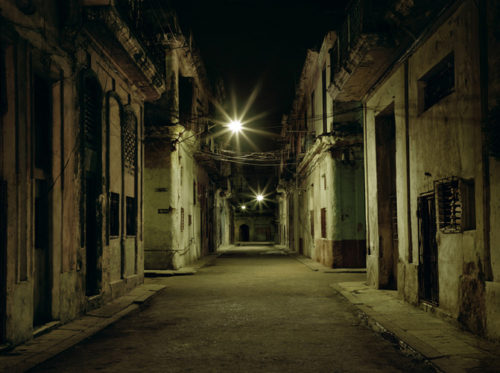
Desiree Dolron, photography.
“The weakness of the ego nowadays, which beyond its psychological
dimension also registers the effects of each individual’s real powerlessness
in the face of the societalized apparatus, would be exposed to an
unbearable degree of narcissistic injury if it did not seek a compensatory
identification with the power and the glory of the collective.”
Adorno
The conformity of the present faux Utopia of America’s educated white liberal class is one that digs its heels in to fight change. It is a kind of powerlessness to imagine anything outside this narrow and ever narrowing box of the same. And the election of Trump has been a catalyst to release this regression. Trump is the image that is so comforting to rebel against. Finally someone to hate and feel good about hating. The compulsive retreat from change must be insisted upon as a Utopian vision. For the art that is coming out of contemporary America is always Utopian now, but a false Utopia, for while the intention or message is couched in terms of change or heterodox individuality, the system has already pre-digested this revolt. Hence, the voices of the underlcass, for example, must be silenced, ever more ruthlessly, because such voices violate the strict tenants of this pre-digested grammar. All expression is partly, even if minutely, a form of Utopian rebellion. And any possibility of an expression of anti-bourgeois sentiment or any perspective that denies the system that allowed its creation, is cause for censure.

Ad Reinhardt
There is a populist element in this whole discussion, for this is the age of *entertainment*. And entertainment is a way to justify the policing of radical voices or expression. The idea of popularity is pernicious today. But this is the paradoxical aspect, too. That idea of *artificial negativity* has legitimacy in terms of culture; for even the most micro-managed piece of kistch junk, can, on rare occasions, offer a failure aesthetically that also has productive aspects for loosening the control of a system that dominates all expression. For certain artworks can reflect the failure of a heterogeneity of vision — the emptiness of certain works, some intentional and private and some mass produced — captures something of the experience of subjective privation in contemporary life. Adorno wrote, in his limited writing on literature, on certain poets whose language expressed an historical process in a sense. But there is a flip side to these moments of clarity. And that flip side is part of the cunning of domination today. And one sees this in the endless self referential love of kitsch. Those who know every 1950s science fiction movie ever made. Or who collect quotes in their head from cheesy TV sit coms from the 70s. And increasingly in mainstream Hollywood product characters will refer to other older *bad* movies. A recent episode of Agents of S.H.I.E.L.D. had two characters constantly going back and forth about 1980s robot movies. This IN a comic book TV show that itself is a reflection of this self referential mirroring. An infantile cartoon with living actors. So the spaces for loosening of the compulsive sameness, the repetitions, is neutralized by over-valorizing all kitsch as a form of connoisseurship. And, there is always the subverting of the sincere. The invitation to the in-joke is a way to pander to the audience, at the same as making known that nothing is to be taken seriously.

Nazi Party Congress, Nuremberg, 1938
But the flip side of the flip side is to know that there is no total autonomy, and that everything and everyone in the creative process is participating in the perpetuation of the myths of barbarism and their own subjugation. But even this is paradoxical (or dialectical) because all contemporary artworks, in any medium, contain echoes of much older emotions and tensions. These tensions or unresolved traumas, are what new work is in the process of mystifying. The ancient and the pre modern and right up to the recent past — all work is commenting on previous work. And yet, it is not quite that.
“It is as though everything is perceived through a schema of rigidified phrases”
Adorno
So, the commenting is only another repetition, but as such is a symptom of the regression. The origin is the goal. Only the origin is a really the result of the goal, and once the spatialization (linear) of the temporal is recognized then this becomes clearer. History is not a journey through rooms, rooms we decorated ourselves.
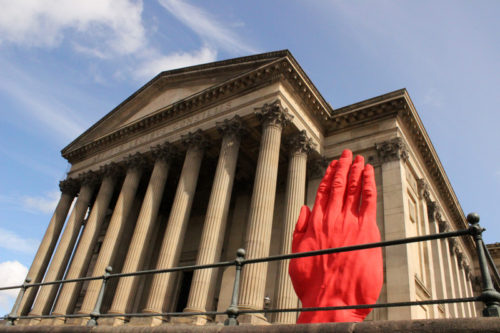
Bogdan Rata. (St. George Hall, Liverpool Biennial).
Ulrich Plass, in a really excellent book on Adorno’s thought, writes:
“The only adequate response to the decline of criticism and the loss of the
authority of tradition is to take each work of art “as seriously as if the work
were what it claims to be.” It has to be judged not merely by what it is, but
by what it aspires to be, regardless of how far it falls short of its claims. Nothing
less than the absolute will do—the only applicable aesthetic norm is that
the work of art, as an absolute, be completely autonomous from all norms
and demands. However, the phrase “as if” reminds us that seriousness is possible
only in conjunction with the irony whose absence in Germany Adorno
laments. Adorno’s criticism is serious for the sake of irony. Hence, what he
noted about philosophy also holds true for his literary criticism: “Philosophy
is the most serious of things, but then again it is not all that serious”.”
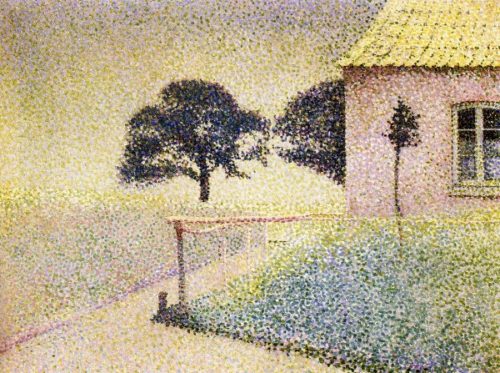
Henry Van de Velde
Another way of saying this in a sense to assume your audience is an ideal audience of the most perfect intellect. For as soon as that assumption fails, the creeping toxin of populist cliche enters the discussion. The worst offenders today are film reviewers, and worse than film reviewers are academic film reviewers (Eileen Jones at Jacobin is the poster girl for this and OF COURSE she is the in house cultural populist for Sunkara’s rag). But I digress.
It is necessary to mention the idea of seriousness, here. The loss of seriousness in general has been acute for forty years. But the loss of seriousness has now become, over the last fifteen or twenty years, ossified and itself a kind of illegible idea. Most people won’t quite know what you mean if you say seriousness has disappeared. For what do you mean by *seriousness*? The popular association with seriousness is humorlessness. In fact this was an aspect of what Adorno saw as so significant in Beckett. But in genuinely serious work today the humor is often unread. Few productions of Shakespeare are very funny, now. I remember whenever I visited the Pollock room at the Modern in NYC I was always ready to laugh. Faced with giant walls filled with Pollocks cannot be other than funny.
Plass noted that the centenary celebrations of Adorno’s birth (2003) focused mostly on the man and not the thought. Seeing him as the perfect example of the Bildungsbürger (cultured bourgeois gentleman). And most of the contributors wrote mostly of themselves and their coming of age stories. Adorno would have found a great essay in this.

Jacopo Pontormo (Annunciation, detail, 1528).
Adorno saw living in the shadow of the massive crimes of his century as akin to participation in collective guilt, but also as memory of missed possibilities. And this is the Lacanian idea of the missed appointment. For we are always late. That is the impossible. The reading of artworks changes because our engagement is participating, in some fashion, with the process of history. Both collective and, importantly, individually. Artworks cannot but be, in part, a recreation of our own psychic formation. And out psychic formation is, in part, a reflection of the history of humanity. And this is why the return of the repressed remains such a hugely significant idea. In his later years, Adorno saw something in German society that he called a *shadow culture*. I suspect this shadow culture is now far more advanced in 21st century America. The *shadow culture* is what stands in for organic culture, of which almost none exists. Again Ulrich Plass notes that Adorno was well aware of the danger of fetishizing culture while critiquing it — that an artificially reconstituted ‘seriousness’ will invariably turn into a kind of fascist mythology. It is the tendency to simplify history and make it a myth of primal origin.
So, again, *origin*. And in the U.S. today the danger is not in what Don Trump has to offer (which is bad enough) but in this release of bourgeois self loathing and fear. For the anti Trumpism of the liberal bourgeoisie is far more fascistic than Trump’s cartoon authoritarianism. That Trump could even become president is proof of the growth of a shadow culture, of reserves of latent untapped rage and racialist mania. When Adorno wrote in the 50s of a *half Bildung* … a sort of half education…he stressed that such energies can only exist in opposition to a dominant system that serves as a repressing force. In this sense Trump was a necessary invention for the built up rage and hysteria of the white bourgeoisie in the U.S. Without Trump, as it was under Obama, the affluent gatekeepers of culture and the managerial class were increasingly stultified in their expression. The system could barely manufacture, in cultural terms, good comic books. If the idea of an *artificial negativity* has any merit, it will reveal itself in the coming years as a by-product of the simple minded expressions of narcissistic rage from the liberal class. A by product that will represent the death of culture itself.

Armando Reveron
The continuing weight of Ad Reinhardt’s black paintings stand as but one precursor to some new testament to cultural death. For the official culture of America is in paralysis. And the only artwork of value is that which admits failure as a bridge to relevance.
Allow me a longer quote from Plass here…
“Adorno the pedagogue answers this Kantian paradox by suggesting that
the enforcement, the imposition of the canon is the very condition for intellectual
autonomy, which is not the same as freedom from tradition but rather
freedom in relation to tradition. The popular definition of *Bildung* as the
intellectual appropriation of a canon of values and stories is precisely what
Adorno rejects. The mere accumulation of knowledge does little to elevate
the subject above the level of *Halbbildung*. According to Adorno’s argument,
many of the typical props of education, such as reading lists, grades, and
exams, are simply symptoms of “reified consciousness,” the education industry
merely a division of the culture industry. Yet the fact that Adorno regularly
returns to the idea of *Bildung* seems to indicate that he is not willing
either to declare *Bildung* a thing of the past or to hand it over to the political
forces of cultural conservatism that turn *Bildung* into a fetish: the canon in
itself is not a positive value. It is valuable only when one experiences it as
force and learns how to resist it. On the uses of tradition, Adorno remarks
“One must have tradition in oneself, to hate it properly”.”
Adorno, especially in his later years, saw education, an educational system, as a preventative tool. He rejected the idea of education as a privilege. The idea of education as an anti fascist tool is something forgotten today. And in terms of art education, a cultural and arts education cannot be about skills before it is about *truth*. This also echoes Horkheimer’s thoughts on instrumental reason. But part of this entire death of culture trope can be found embedded in the blanket cruelty of western societies today.
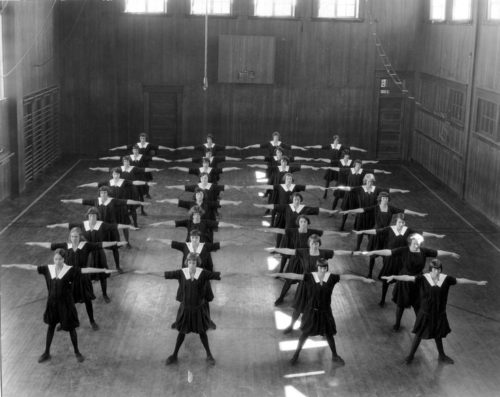
Fullerton Union High School gym class, 1920, Fullerton CA.
“Now that the bourgeois world is entering a new situation which may be interpreted either as more rational or as regressive, the forms of human relationship which originated in the feudal order and were transposed to a new level in the bourgeois order are about to be liquidated. Bourgeois culture was deeply influenced by the dignity, honor, and freedom of the feudal lord and, in the last analysis, of the absolute ruler; it transferred these attributes to every individual man and especially to anyone who was well-off. Works of art, language, personal culture, forms of intercourse in business and private life, all took over the symbols of that bygone social distinction which they were rejecting. It has always been characteristic of liberal civilization that hierarchy and subordination are its freely adopted form.”
Max Horkheimer
Horkheimer’s late essay on the shifts in the relationship between buyer and seller of commodities is remarkable to read today. For it a keenly prescient piece of writing. For today (and the essay in question was written in the late 60s) the buyer must adapt himself to the seller. One sees this more obviously in the affluent classes. A man with who wants to build a new house and contacts an architect must almost beg for to give the architect this commission. The expert now forms a new priest class. And this speaks to the erosion of even the pretense of a market economy. And it is another example of this shadow culture. Or rather of a full on dead culture. The last vestiges of feudal traditions and manners died after the second world war and the ensuing half century or so has been a steady eradicating of all traditions of human interaction. Today daily life in the U.S. is (unless you have extreme privilege) is one of constant scrutiny of your fellow citizens as well as a basic siege mentality about career and future. The expected pleasures of leisure time (or *free time*) are rarely realized. People feel glad if they simply escape severe displeasure.
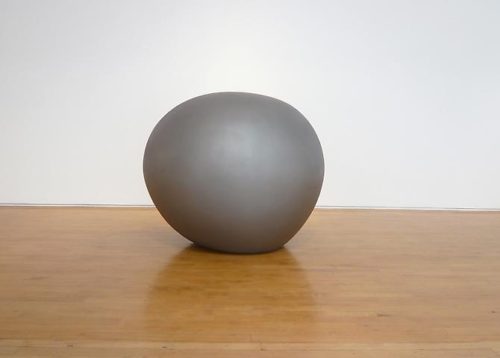
Jene Highstein
“External evidence of the habituation of the subject to domination is found in every facet of everyday life; as such, the issue of how reification blocks the working through of guilt to secure the present system emerges. Through the adjustment to technology, to take an example, the body is habituated to brutality and the mind is trained not to question, reflect on, or refuse this conditioning.”
Amy Buzby
The mass regression of today’s culture is of course assisted by what Buzby calls a habituation to domination. And one form of this habituation is the insistence on clear one dimensional meanings and *proofs*. It is no wonder that SNOPES is now employed by facebook to curate (per Obama) disputed content. Whatever that might mean. The very idea that disputing content is presented as de facto bad tells one everything. Absolute certainty is then comforting. True or false. And all argument is dismissed because everything must be totally true, or totally false. And Buzby notes that guilt plays a huge role in this demand for certainty. For everyone is guilty in their own private court of law. It is hard, when thinking on all this, not to be reminded of Dostoyevsky, yet again. The inability to work through one’s guilt will derail all attempts to accept even the idea of social change. Again, the current hysteria surrounding the election of Trump feels very much like a projection of guilt. It is also partly an aspect of scapegoating. I have read repeatedly on social media the various complaints about Trump and symbolic reactions — everything from burning L.L. Bean flannel shirts (I guess because Linda Bean was a supporter) to the Rockettes refusing to perform at the inauguration — it is the symbolism of distraction and a society of trivia. It is also a white guilt, and it is part of a shadow culture that is reaching a terminal state. For culture, art and expression of any kind, is complicit with social guilt.

Elliot Erwitt, photography.
“…the individual who identifies with fascism does so because he has failed to develop the capacity to test and engage reality:Thoughts, beliefs, and conformist activities are thoroughly disconnected from the possibility of independent identity and self-formative practice. “
Amy Buzby
There is also a rising sense of imaginary solidarity among the anti Trump groups. All the meanness and shaming directed at this new President, and unsurprisingly his wife, is not only permitted, it is enjoyed.
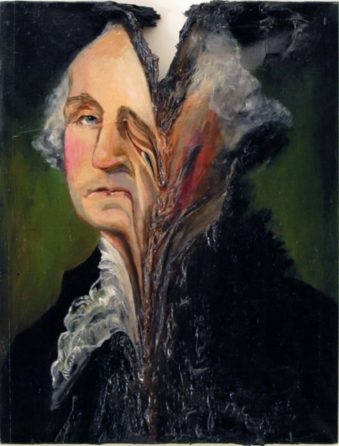
Valerie Hegarty
“Prejudiced men not only submit to punishment, they emphatically agree with the administration of harsh punishment. They identify themselves with the administration of harsh punishment. They identify themselves with the punisher and enjoy the punishment, moreover, because it speaks to the harshness of the superego and the unresolved emotional conflicts of childhood. Even as adults, they cannot transgress “a narrow path of seeming virtue.” This sadomasochistic orientation reveals that the prejudiced subject has failed to master ambivalence, the simultaneous love and hatred for another that often culminates in the splitting of the other into “good” and “bad” aspects.”
Amy Buzby
Hullot-Kentor, when writing indirectly of Bush Jr. says…
“The chanting eloquence and brutal high spirit of this fairy tale of
national origin was to goad, enthuse, and restore to its labors a colonial
nation still in its coonskin cap. But while the caps have changed,
Emerson’s big bellied, pristine sky, in its spontaneous incapacity to acknowledge
its gut fill, hovers in steady familiarity over the course of
American centuries. It perdures legitimately as tradition, though certainly
not as evidence of an exceptionally American tradition but—as
is now starkly visible from whatever angle the country is regarded—
as the tradition of the progressively generic itself.”
The mass anger directed at Trump is a part of a national narrative of white supremacy. As paradoxical as that perhaps sounds, I believe its rather obviously true. That Trump is a racist is utterly beside the point. The overt hood figure of the Klan is but one artery of a white supremacist hierarchical social infrastructure that continues to reproduce the basic slave owning plantation system that emerged out of the 17th century. When I read various Trump protests I am reminded of Mary Shelley, the author of Frankenstein, who protested the slave owning plantation system of sugar growers in the Caribbean by not sweetening her coffee or tea.

Catalin Badarau
This narrative is one in which tens of millions of brown and black people perish at the hands of white Europeans and North Americans without ever a collective outcry or gesture of collective remorse. Not a peep. Silence. For this is another aspect of this psychic movement toward silence. The shadow culture cannot read, and cannot almost not speak. It tweets and texts. The totalizing aggression of the collective (per Buzby) is unchecked by individuation. The culture of individuality is completely without it. And without any access to Dionysian erotic release there is only the death instinct. And advanced Capitalism has reached a point in this grand narrative where the self-promoted exceptional American has an ego so weak that he or she cannot cry out. Hence the increasing anger at those who do cry out. The poor, the criminals, the marginalized — these cries incite anger in the bourgeoisie who want EVERYONE to join them in condemning the wrong neo fascist in the White House. Or in hating Putin, or whoever is being sold by media today as evil. The poor are blamed for not following instructions on hatred. The role of guilt has changed, however, to the degree that early submission to parental punishment is now delayed or mediated in various ways. Therefore the therapeutic age today has adult children still ambivalent about authority to some degree, or rather ‘more’ ambivalent, and who look toward improving themselves in one or another form of therapy. This self is examined as if its a DIY TV show. The guilt of Trump, which is glaringly apparent, allows for feelings of virtue in those who protest him. The also obvious crimes of Obama and Clinton allowed for no such feelings of virtue. But it DID allow for a more easily buried sense of guilt in those who voted for them.
In ancient cultures, from North America to Borneo, the collective would mourn the murder of enemies. The Sea Dyaks of Sarawak would cut of the heads of the slain enemies and bring them home and shower them with affection. Theodore Reik saw collective guilt being articulated as such first by middle eastern societies a thousand years before Christ. The capitalist west has no ceremonies of mourning for enemies. And it is such failures of memory and such truncations of remorse that have created this shadow culture, or post shadow culture. One of an increasing desperation to crawl out from under a system of homogenization which is understood, even if unconsciously, as deficient in some very fundamental way.

Taner Ceylan
The cultural products of U.S. culture today, the post shadow culture, are, in a way, mirroring the way Adorno and Horkheimer read Homer. In the Odyssey, it is the journey of reason itself. In U.S. film today, the medium which eclipses all others, the stories are of reasons’ nullification. And such nullification is carried out under the rubric of narcissus. American film is always, now, about itself. There is an almost new form of nostalgia at work in this (think LaLa Land, Birdman, et al).The pathology is expressed, again, as a failed ambivalence. The entire super hero phenomenon is a non journey, it is the narrative of the missed appointment…or to extend the metaphor; it is the journey that didn’t happen because you missed the train.
“The term ‘ambivalence’ implies the insertion of history (society) into a text and of this text into history; for the writer, they are one and the same. When he speaks of ‘two pathes merging within the narrative’, Bakhtin considers writing as a reading of the anterior literary corpus and the text as an absorption of and a reply to another text.”
Julia Kristeva
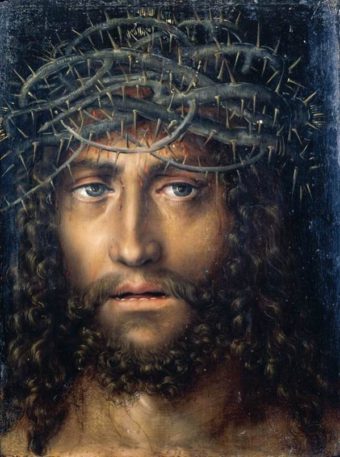
Lucas Cranach the elder (1525).
When artworks no longer acknowledge anterior works, or simply turn them into redecorated rooms to visit, the culture has reached exhaustion.
“The discourse of post-Enlightenment English colonialism often speaks in a tongue that is forked, not false. If colonialism takes power in the name of history, it repeatedly exercises its authority through the figures of farce. For the epic intention of the civilizing mission, ‘human and not wholly human’ in the famous words of Lord Rosebery, ‘writ by the finger of the Divine’ often produces a text rich in the traditions of trompe-l’oeil, irony, mimicry and repetition.”
Homi Bhaba
The post shadow culture can only continue to engage in what are, in macro terms, a kind of terminal game. It is a Beckett play partly, where Hamm and Clov know the outcome but play anyway. For this is what Nietzsche described as an ‘exterminationist game’, one you can only play once. It is yet more ambivalence, an ambivalence for a generation who cannot write or speak and hence rely on screens to direct them (We’ll be right back after this short commercial) and whose social sense is determined largely by screen life as well. Those who protest Trump without protesting Obama or, really, Capitalism, are then looking at the *other* in colonial terms. Human and not wholly human.
When Beethoven was very old, and writing his late quartets, he was admonished by a first violinist that what he was writing wasn’t music. Beethoven replied, ‘oh, it’s not for you, it’s for a later age.’

Felix Deac
Assuming we have a later age. Nobody, no artist I can think of today, would say such a thing. And until art is made again with an awareness of anterior narratives, where reason journeys — in any direction, or journeys directionless — and for a later age, then this privatized violence of outsized militaries (ten or a hundred times bigger than needed to end all life on the planet) will continue their cost/effect ratios analysis and working to rationalize that which cannot be rationalized.
“…the spectacle, at least as staged by the mainstream broadcast
media, seeks simultaneously to assuage and exacerbate anxieties of all
sorts by providing images to which they can be attached, ostensibly comprehended,
and, above all, removed. Schematically, the fear of death is
encouraged to focus upon the vulnerability of the other, which, as enemy,
is the other to be liquidated or subjugated. The viewer is encouraged to
“move forward” and simultaneously to forget the past; encouraged to identify
with the ostensibly invulnerable perspective of the pilotless airborne
camera that registers as blips the earthbound destruction tens of thousand
of feet below. Such a position seems to assure the triumph of the spectator
over the mortality of earthbound life.”
Samuel Weber (on 9/11)
This is a kind of Beckett play, then.
HAMM (gloomily):
Then there’s no reason for it to change.
CLOV:
It may end.
(Pause.)
All life long the same questions, the same answers.

“When I read various Trump protests I am reminded of Mary Shelley, the author of Frankenstein, who protested the slave owning plantation system of sugar growers in the Caribbean by not sweetening her coffee or tea.”
John, this seems to me a PERFECT illustration of the neo-libs’ frantic opposition to Trump.
We now lack the most basic ability to reflect upon the ethical ramifications of our collective silence in the face our own atrocities. While doing therapy with adult sex offenders years ago, I was surprised to find that the very same psychological defenses they consistently employ, which allow them to sexually assault children and live with themselves, are the same ones we “normal Americans” utilize in order to live with the ongoing carnage that is American empire. Denial, minimization and rationalization were the typical defenses used by offenders. “I did not sexually abuse her,” “it wasn’t as bad as it sounds,” “if I didn’t teach her about sex some uncaring person would have.’ Grotesque, without a doubt. Very predictable offender to offender. The men I treated tested low in psychopathic traits and could only be differentiated from the general adult population by the fact that they were convicted of having sexually abused children. As grotesque as these self-deluding defenses appear, I find they are no more grotesque than those that characterize “normality’ in our society: “we are not saturation bombing Cambodia and Laos,” “water boarding isn’t torture,'” “we think it’s worth it (in reference to the deaths of a half million Iraqi children).” Your examination of individual and collective psychological defenses and phenomena are I think very important to the discussion of how this collective brutality and madness continues. How indeed does anyone who was silent for 8 years of Obama’s brutal policies of mass destruction and murder find Trump’s pathetic comments on race and gender to be simply more than they can bear without now speaking out? Really?
good observations, gary.